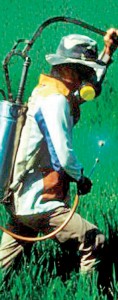Sunday Times 2
Toxic weed-killer glyphosate linked to cancer and antibiotic resistance
Glyphosate, the toxic chemical found in weed killer Roundup, which is heavily sprayed onto local farmlands, has been linked to antibiotic resistance in addition to being a trigger for cancer, an international NGO has warned.
The warning comes just weeks after the World Health Organisation’s main cancer research agency, the France-based International Agency for Research on Cancer, released its findings on glyphosate and five pesticides including malathion.
Malathion is also used widely locally and the WHO agency said it could also cause cancer.

The toxic weed killer glyphosate is destroying lives in many countries. Pic courtesy International Rice Research Institute
Glyphosate, or N-(phosphonomethyl) glycine, has been fingered as the prime suspect in chronic kidney disease that is slowly killing an estimated 400,000 helpless Sri Lankan farmers and their families.
Roundup, which contains glyphosate, is made by American seed-producing behemoth Monsanto.
According to the New York-listed company, Roundup “can be used as part of an environmentally responsible weed control programme and fit with our vision of sustainable agriculture and environmental protection”.
Monsanto boasts that “there’s no other herbicide like it”.
Sri Lanka continues to debate the strength and weight of evidence against the weed killer and the deadly chronic kidney disease, which causes long-term misery.
Pesticide Action Network International describes the cancer-causing properties of glyphosate and antibiotic resistance, as not one but two wake-up calls to everyone.
In a statement, Judy Hatcher, vice-chair of Pesticide Action Network International, said glyphosate and other herbicides have been linked to antibiotic resistance.
“The combination of carcinogenicity and antibiotic resistance by Monsanto’s flagship pesticide [Roundup] are two loud wake-up calls for the global community. Policymakers as a matter of highest priority, should keep the next wave of genetically engineered seeds — containing glyphosate and other old, hazardous chemicals — off the market.”
The International Labour Organisation defines a “carcinogen” as “a chemical substance or a mixture of chemical substances that induce cancer or increase its incidence”.
Pesticide Action Network International said researchers in New Zealand have found that formulations of herbicides containing glyphosate, 2,4-D, and dicamba can lead to development of antibiotic resistance in disease-causing bacteria, such as E. coli and Salmonella. Dicamba and 2,4-D (made by Dow Chemical) are pesticides.
The WHO agency found glyphosate as “probably carcinogenic to humans”, the NGO said. Researchers concluded that there is sufficient evidence of carcinogenicity in animals used in experiments.
The toxic weed killer glyphosate is destroying lives in many countries.
Head of Pesticide Action Network International, Javier Souza, said in the statement that in Argentina, “thousands of people suffer from glyphosate poisoning related illnesses and the cancer rates are two to four times higher than the national average”.
Souza cited Argentina’s 24 million hectares of crop, mostly soybeans, genetically engineered to resist glyphosate.
In 2014, 79 million gallons of glyphosate were applied on soybeans and other crops in Argentina.
Javier said in the statement that Monsanto’s weed-killer glyphosate is “wreaking havoc with the health of children and rural communities in Argentina”.
Pesticide Action Network International urged emergency measures to reduce and end the use of herbicides containing glyphosate.
GLYPHOSATE LINK TO CANCER
- The World Health Organisation’s International Agency for Research on Cancer reported on March 20 after a study that glyphosate was “classified as probably carcinogenic to humans”, and that there was “limited evidence” that glyphosate was carcinogenic.
- The study also found there is limited evidence that glyphosate can cause non-Hodgkin’s lymphoma and lung cancer.
- “There is convincing evidence that glyphosate also can cause cancer in laboratory animals,” the study found.
- “Limited evidence means that a positive association has been observed between exposure to the agent and cancer but that other explanations for the observations (called chance, bias, or confounding) could not be ruled out,” the researchers observed.
- Roundup weed killer maker Monsanto has questioned and challenged the WHO agency’s findings.
- “Glyphosate has been detected in the air during spraying, in water, and in food, the WHO agency reported. People are exposed mainly by living “near sprayed areas, home use, and diet, and the level that has been observed is generally low,” the report found.
- At least 14 weed species and biotypes in the United States have developed glyphosate resistance, affecting more than 60 million acres of US farmland, according to data gathered by the US Department of Agriculture and U.S. weed scientists. The herbicide-resistant weeds hinder crop production and make farming more difficult and expensive, Reuters reports.
- The US Environmental Protection Agency confirmed it will require a weed resistance management plan for glyphosate. The agency has scheduled a conference call this week with a committee of the Weed Science Society of America to discuss what the final plan for glyphosate should entail, said Larry Steckel, a Tennessee scientist who chairs the committee, Reuters reports.

